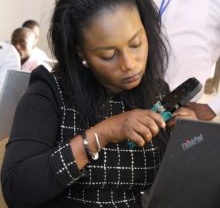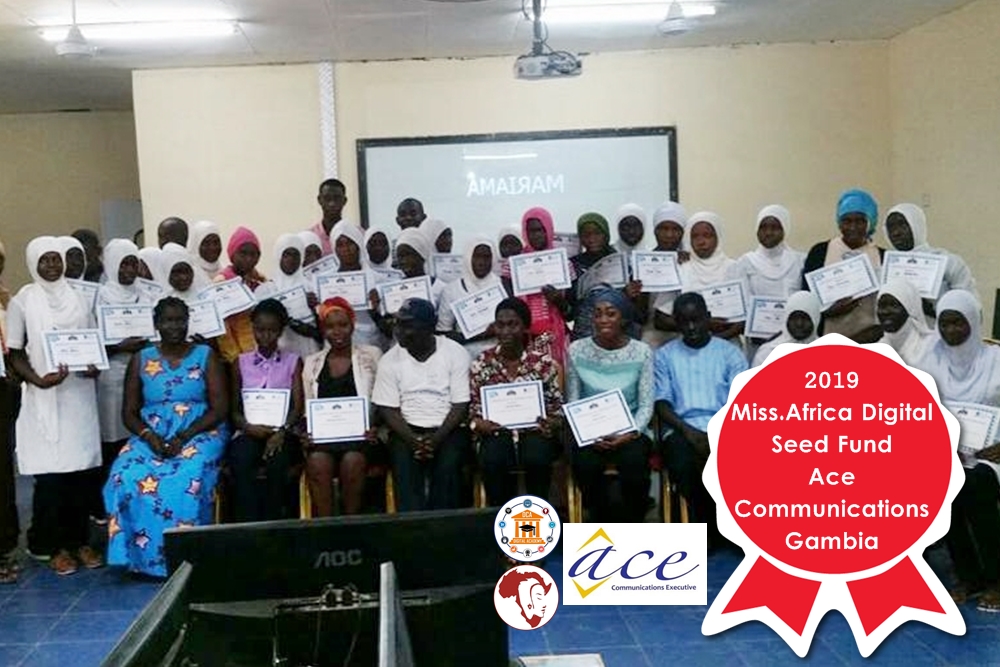Miss.Africa Digital Program recently caught up with Mrs. Fatim Badjie – Sinyan, CEO, ACE Communications. ACE will train students from all seven (7) regions of the Gambia in introductory topics. Students will be selected from each region, after which they will travel to the West Coast Region to attend the camp with a counselor, a social protection worker and a teacher from each region. She speaks about their program in our interview below
Can you tell us about this project that has applied for the 2019 Miss Africa Digital Seed Fund Awards?
Girls ICT Camp is a project that aims to bring together girls from different parts of Gambia to learn about basic IT skills and importance of ICT and fields in STEM. Through this camp, girls will connect and gain mentorship, coaching and gain awareness as a form of empowerment. The aim of the project is to decrease the knowledge gap by closing the gender divide and breaking the social and cultural barriers that hold girls from pursuing careers in ICT/STEM. It is hoped that the Seed Fund Award would be a great source of early support for many Gambian girls who can pursue promising careers in ICT/STEM for socio-economic development.
What are some of the challenges you are trying to address with your project?
- Cultural & Social Barriers
- Lack of access to information and Lack of effective ICT use are key causes of gender divide
- Education, Literacy, Language skills, Mobility, Career Choices and Interest
- Women access ICT mainly through radio especially in the rural areas where a higher percent of the female population reside
- Shift in cultural perspective and mindset of society that ICT/STEM areas a better suited for men
- Digital Divide: Lack of access to ICT by certain communities or societies (for example, rural vs. urban, private schools vs. public schools, privileged vs. underprivileged)
- Gender Divide: Lack of access to ICT by females in certain communities and societies
How are you bringing innovative approaches to these problems?
- By advocating ICT and STEM as a path for social and positive change especially for girls and women
- Revolutionize the ways in which traditional services are produced, traded and delivered, as girls and women become capable of thinking and creating innovative solutions that can benefit society
- By building a strong ability and network where young women can connect, communicate and innovate from a national and global level
- By moving girls away from their typical surrounding and exposing them to such a motivating, informative, educative and empowering experience.
How does it feel to gain international recognition for your work?
I am feeling humbled and honored, it just fuels me to do more in creating a better future for our young.
Can you explain why skills for women in tech are so important?
Its important to make ICT inclusive, there is already a low number of women working in ICT.19.2% ICT sector compared to 42.5% non ICT sector have female bosses. Data shows that organizations that are more inclusive of women in management earn 35% higher Return on Equity. Women in ICT sector earn almost 9% more than women in non-ICT sectors. Tech is one of the fastest growing industries in Africa; with more women in tech fields African women stand to gain a whole lot more. Moreover women in tech and STEM significantly decrease knowledge and gender gaps while reshaping the labor market.
What in your opinion should be done to address the digital skills gap in Africa?
There are several means in addressing the digital skills gap in Africa, I would start off with the need to offer more ICT Skills training programmes especially at an early stage. Through education, providing public ICT access through libraries and community centers. The access and training has to fair and equally available to disadvantaged or underprivileged groups. If possible, through distributing free training resources through libraries and community centers. Furthermore, structures need to be established and decentralized for public knowledge sharing and easy project support. Eventually, these interventions from both private and government support can begin to change cultural perception and close the gap. Government support is paramount in promoting and strengthening sustainability through policies and projects. Lastly I believe Africa as a young continent, needs as many mentorship programmes and entrepreneurial skill training as possible in order to harness the use of ICT in a tangible and useful manner.
Mrs. Fatim Badjie – Sinyan, CEO, ACE Communications
 Ace Communications Executive (ACE) was founded in March 2009 and functions as an communications management, training and PR consultancy firm focused on meeting the growing communications demands for business, public and international institutions across the West Africa.
Ace Communications Executive (ACE) was founded in March 2009 and functions as an communications management, training and PR consultancy firm focused on meeting the growing communications demands for business, public and international institutions across the West Africa.
ACE will train students from all seven (7) regions of the Gambia in introductory topics. Students will be selected from each region, after which they will travel to the West Coast Region to attend the camp with a counselor, a social protection worker and a teacher from each region.
